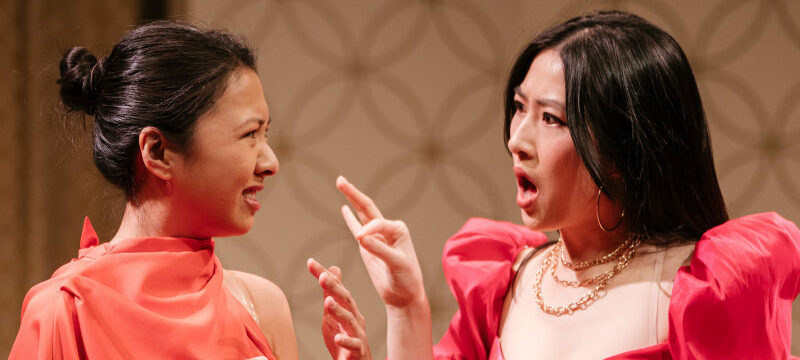Save articles for later
Add articles to your saved list and come back to them any time.
THEATRE
Miss Peony ★★★½
Fairfax Studio, Arts Centre Melbourne, Until August 20
What does it mean to be Chinese? The “twenty-six, friendless, unmarried” Lily (Stephanie Jack) struggles to know, but the ghost of her recently deceased Poh Poh (Gabrielle Chan, who delivers a star turn as Lily’s ethereal, imposing grandma) has an idea: Lily has to enter Chinese community beauty pageant Miss Peony (which Poh Poh pioneered) and win it.
Miss Peony is at Fairfax Studio, Arts Centre Melbourne, until August 20.Credit: Jason Lau
Enter Lily’s three competitors: filial Shanghainese businesswoman Marcy (Deborah Faye Lee); diminutive, eccentric Joy (Shirong Wu) from Taiwan; and western Sydney born-and-bred Sabrina (crowd favourite Mabel Li), whose thick Lebanese-Australian accent is harnessed to great comedic effect.
Guided by pageant producer Zhen Hua (played with startling accuracy by Jeffrey Liu), the group is evenly split between ABCs (Australian-born Chinese) and migrants – the play expertly explores the dualities of the former, the regional specificities of the latter, and the nexus of sexism, racism and homophobia.
Marcy, Joy and Sabrina come to life superbly over the course of the play, acquiring depth, dimension and nuance as their personal histories and foibles come to the fore. In comparison, Lily feels underdeveloped – while there’s a strong, necessary ambivalence at the heart of a character who’s parsing her identity, she often feels like a vessel for the broader themes at play rather than a fully developed character in her own right.
The characters switch seamlessly between English, Cantonese and Mandarin, amplifying the polyphonic feel of the play. Every word, not just the Cantonese and Mandarin ones – a crucial distinction because it recognises the crowd is as likely to consist of audiences whose first language isn’t English – is subtitled on a screen perched aloft the stage.
Stephanie Jack, as Lily, and her Poh Poh, played by Gabrielle Chan in Michelle Law’s Miss Peony.Credit: Jason Lau
The inherently entertaining beauty pageant framework lends the play a natural dramatic tension with a narrative arc recognisable to most people. Despite this, the play’s pacing is off-kilter at times and there’s lengthy, at times unnecessary, exposition.
Jonathan Hindmarsh’s sparse set – a raised marble stage surrounded by steps – is simple yet effective, transformed into a hospital, beauty pageant podium and restaurant at different junctures. With most of the play’s action happening on an elevated level, the characters are on display to us as they are to each other and their community at large – heightening the stakes for young Chinese-Australian women grappling with how best to honour their cultural identity while leading a life that rings true to them in 21st century Australia.
There are nods to Chinese culture peppered throughout – the humorously overblown battle for the bill, the sly reference to Coffs Harbour’s biggest attraction to illustrate how Lily is a “banana”, the intimate hot pot meal where the women commiserate with one another over sexist treatment they’ve received. It’s in these sections where playwright Michelle Law’s writing is at its strongest.
Hindmarsh’s costume design is resplendent. The women flit from one outfit to the next – stunning red dresses, glitzy sequined floor-length numbers, figure-hugging cheongsam. Fittingly, in the last scene, Lily wears a cheongsam underneath a coat with her feet enclosed in shiny patent leather brogues – illustrating that, perhaps finally, Lily has found a way to bridge the gap between her Australian upbringing and her Chinese heritage.
By choosing to explore the push and pull between two worlds against the backdrop of a beauty pageant, Miss Peony finds new ways to tread old ground.
The Booklist is a weekly newsletter for book lovers from books editor Jason Steger. Get it every Friday.
Most Viewed in Culture
From our partners
Source: Read Full Article


